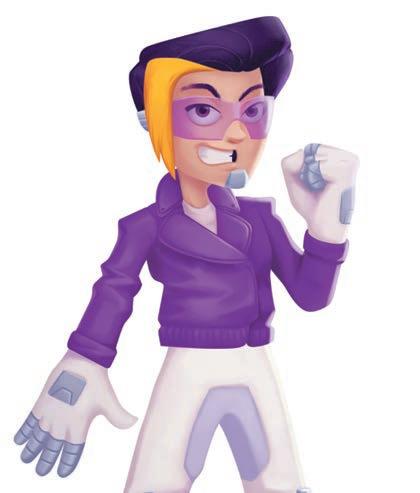
15 minute read
The importance of bridging the digital divide for primary school children
SARAH DAVIES, CEO OF NATIONAL CHILDREN’S CHARITY, THE ALANNAH & MADELINE FOUNDATION, DISCUSSES WHY ALL CHILDREN MUST HAVE ACCESS TO DIGITAL LITERACY FRAMEWORKS IN ORDER TO BRIDGE THE DIGITAL DIVIDE.
Davies says building digital intelligence across all Australian society is an absolute must to keep children safe from online harm.
ESo much of life nowadays happens online. Digital technologies bring many positive opportunities to children, and reforms to NAPLAN assessments will see Year 6 students being tested on digital literacy, if the school opts in.
But those children who can’t access high quality digital resources or information about how to use them safely may be excluded from basic educational and career opportunities and are also at risk of exploitation.
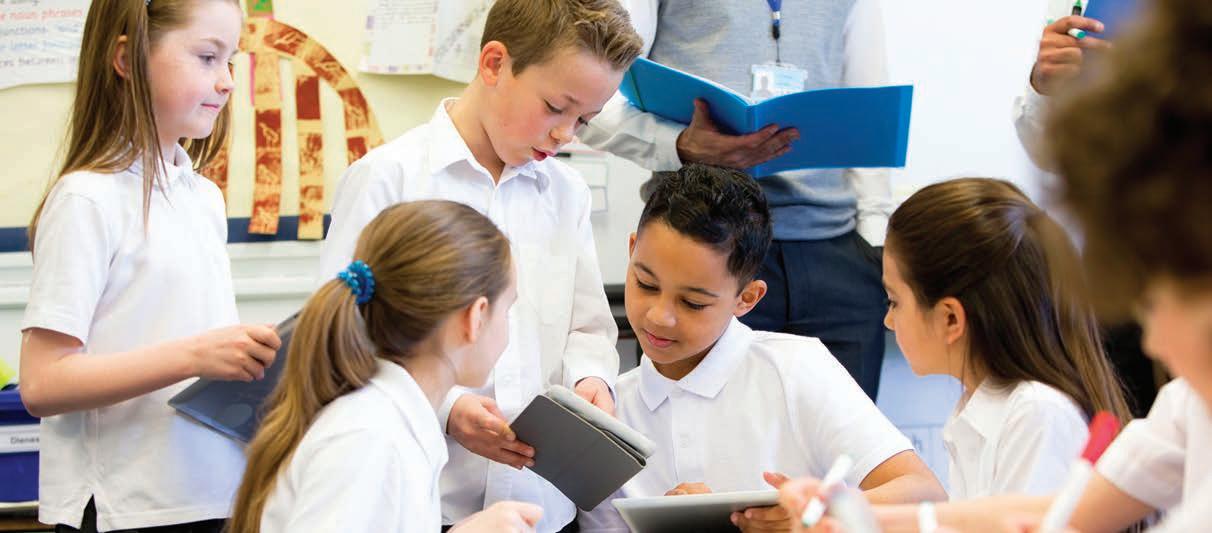
WHAT IS DIGITAL LITERACY AND WHY IS IT IMPORTANT?
Digital literacy describes the set of skills and knowledge that students need to appropriately identify, select and use digital devices or systems. Knowing and understanding how to make the most of the technologies available to them, adapting to new ways of doing things as technologies evolve and protecting themselves and others safely in digital environments are essential skills for all our children.
Poor digital literacy levels can lead to significant disadvantage over a lifetime, with digital inclusion being critical for people to engage in education, employment and public life, as well as to access health, financial and community services.
WHO IS MOST AT RISK OF EXCLUSION?
Many of Australia’s most vulnerable children also have the lowest levels of digital literacy and digital inclusion. According to the Australian Digital Inclusion Index (ADII): • Households with the most precarious access to technology and the lowest digital skills tend to be those which are already struggling with other barriers, such as low incomes, unemployment, disability, internet access through mobile phone data only, and education levels below Year 12.
Indigenous Australians are particularly affected. • Major inequalities exist between capital cities and rural areas. The Australian regions with the lowest digital inclusion are all rural, including
Murray and Murrumbidgee (New South
Wales), North Victoria, North-West Queensland and Southern Tasmania. • There are 130,000 primary school children at
Dex is the main character who guides students through the gamified learning experience.
public schools in the most digitally excluded parts of Australia who suffer disparities in resources.
In particular, the ADII notes that 800,000 school-aged children are growing up in families in the lowest income bracket, where digital inclusion scores are well below the national average.
A survey of nearly 2,000 Australian teachers found that four out of five teachers believed students’ access to educational technology was affected by their socio-economic circumstances.
CHILDREN NEED SUPPORT IN THEIR ‘MIDDLE YEARS’
The years between the ages of eight and 14 are hugely significant for children, encompassing the onset of puberty and the move from primary to secondary school.
The middle years are also a critical time for children’s digital literacy and wellbeing.
An ACMA report found that more than threequarters of Australian children aged 12-13 owned the mobile phone they used, while one in six primary school children have their own social media account.
And with the advent of under-13 specific sites, such as the proposed Instagram for Kids, YouTube Kids and Messenger Kids, as well as six of every 10 kids playing games online, children are very much using digital technology to form social networks.
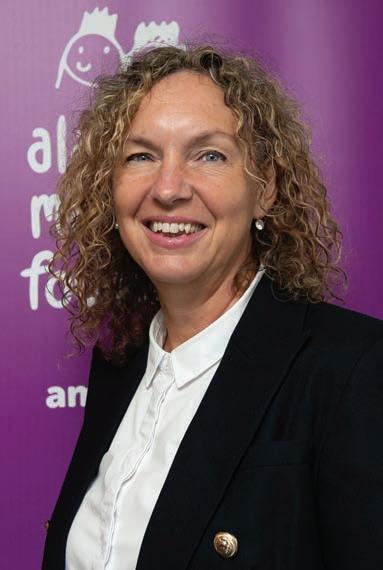
COVID-19
The onset of COVID-19 saw a rapid transformation in the way our children learn. Lockdowns and remote learning are especially hard on families in the lowest income bracket, many of whom lack access to suitable devices and tech options, have fewer digital skills, and who pay more of their household income for digital services, compared to the rest of Australia.
New statistics from the Office of the eSafety Commissioner saw online risks continue to rise through the first half of 2021, even in the absence of extended lockdowns.
Complaints of serious cyber bullying against Australian children, for example, have been up by almost 30 per cent on the same period in 2020.
The onset of COVID-19 saw a rapid transformation in the way children learn with remote learning.
REDUCING DIGITAL DISADVANTAGE
Building digital intelligence across all Australian society is an absolute must to keep our

CEO of the Alannah & Madeline Foundation Sarah Davies.
children safe from online harm.
Teaming up with international digital intelligence think tank, the DQ institute, and the Accenture Australia Foundation, the Alannah & Madeline Foundation has recently launched Digital Licence+, an education and training program aligned to the Australian curriculum which builds digital intelligence among 10 to 14-year-olds.
A completely updated and reworked version of the eSmart Digital Licence, Digital Licence+ offers an exciting, gamified learning experience for students to explore an interactive story world to build digital intelligence.
Focusing on building the knowledge and skills of students across areas including technology use, cyber risk management and online security, Digital Licence+ supports the development of important social and emotional skills in the middle years and assists educators to cater for different learning levels.
A targeted rollout of the Digital Licence+ aims to address the digital divide in regions with low levels of digital inclusion. Across Australia, 100,000 students from schools in regions that have a below average ADII rank will be offered free access in 2022. Visit www.esmart.org.au EM
Creativity: Nature or nurture?
OVER THE PAST 20 YEARS CREATIVITY HAS BECOME AN INCREASINGLY IMPORTANT SKILL, AND EDUCATION SYSTEMS AROUND THE WORLD ARE TRYING HARD TO INTEGRATE IT INTO THE CURRICULUM. BUT IT’S BEEN CHALLENGING TO PUT RESEARCH INTO PRACTICE, ACCORDING TO EDUCATOR AND NÜDEL KART FOUNDER, MARCUS VEERMAN.
EVeerman has been working with creativity researcher and consultant Dr Tim Patston to demystify creativity and communicate the benefits of teaching these skills to students.
Dr Patston’s research found that certain creativity attitudes, when combined, were a better predictor of Year 12 scores than conscientiousness. “In other words, students who had specific attitudes, skills, and attributes of creativity did better than students who just worked hard,” says Veerman. “Perhaps of more importance is that these elements of creativity are not gifts bestowed at birth to some, but can be taught and developed in the classroom from the early years of school to all students so everyone can reap the benefits.” Dr Patston has identified three main factors required for creativity to thrive which are the right Attitudes, Processes and Environment. Veerman refers to this as the APE factor. It’s this APE factor that makes us humans truly unique and so incredible. “This really is a gamechanger for teachers who know creativity is essential but lack a road map to implement it in the school environment,” says Veerman.
For Veerman, the third factor, the environment, is the area that has consumed him for the last three years. He says, if students are put in a classic classroom environment, it will often hinder their creative response, even if the students’ attitudes and processes are good. The three factors all need to work in harmony.
To equip teachers with the tools to teach creativity, Veerman’s Nüdel Kart creates an instant environment for students to practice and demonstrate those attitudes and processes.
Teachers can then observe, and after that, teach the students the attitudes they need to further develop.
“Teachers lead the way through a collaborative and genuine, two-way dialogue with the students to help them build the skills,” he says.
“We need to create authentic open-ended challenges, or even better, let the children develop their own. Both these approaches help students to build their creativity.”
Dr Patston says although teachers have a conceptual understanding of creativity, and believe that it is important, they often lack the bridge which will enable them to include it in their everyday teaching programs and assessments.
“An open-ended Nüdel Kart session doesn’t have a lot of rules. This lack of structure necessitates that children practice these higher order thinking skills like leadership, self-regulation, negotiation, conflict resolution, all critical for success in this century,” Veerman says.
“Instead of the teachers guiding the classes and themes, by using the Nüdel Kart, tasks can be created by the students and will help to cover many of the skills that have been traditionally hard to teach in a rigid classroom environment. This kind of student engagement can be combined with the curriculum to create a deeply engaging holistic learning environment with higher levels of wellbeing.”
With the help of Belgian STEM toy designer, Emma Ribbens, Veerman co-designed the

shopping trolley sized kart for up to 30 children. They then rigorously tested it around the world with wealthy private schools all the way to Syrian refugee camp schools.
“We found the same results - the kart creates a highly stimulating, mobile learning space that trusts a child’s unstoppable urge to learn through exploration, experimentation, and imagination,” he says.
Winner of two Australian Good design awards, the Nüdel Kart is a deconstructable, mobile kart that explodes into a research-backed loose parts space, with 340 pieces, that children can explore with billions of different combinations.
“On top of this we worked really hard with teachers to ensure the kart wasn’t a burden. It is mobile and compact for storage and most importantly, simple to pack up for a tired, time-poor teacher,” Veerman explains.
Compared to most construction and STEM toys where there is an obvious order and way to do things, Veerman designed the kart with a combination of order and some deliberate chaos thrown in.
Following the successful launch of the Nüdel Kart, Playground Ideas has launched the Nüdel Rover, a smaller, more transportable and more affordable version of the original kart.
For smaller groups of up to eight children.
Veerman says the Rover was specifically designed to have an additional therapeutic aspect to it.
Playground Ideas has launched the Nüdel Rover. Collaboration and communication are key to some of the best ideas and creations.

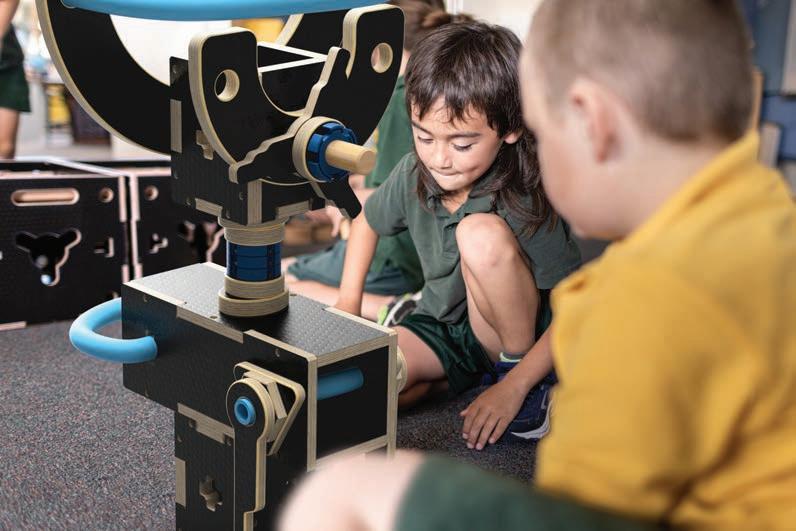

Students use problem solving and negotiation to build more than just vehicles.
“It is of course, designed for educators, but this new size is also perfect for educational occupational therapists, social workers and other allied health specialists to use with students for social skills development and other lagging skills. The materials and quality are the same, it is just smaller in size with a focus on health and wellbeing as well as learning,” he says.
For 12 years, the charity Playground Ideas has supported over 2.5 million children in 143 countries to have more time to express themselves freely and enhance their creativity skills to succeed in the future through play.
Nüdel Kart is its new chapter to support learning and development for this century.
“Education systems are on the way to a creativity revolution, and Nüdel Kart provides teachers with the environment to continue that journey,” says Veerman. EM
Buyer’s Guide
Playground Ideas Ph: 0432 738 719 Email: nudel@playgroundideas.org Web: nudelkart.com
Hands-on unplugged play key to kids’ learning
THEY’RE BIG, BOLD, UNPLUGGED AND IDEAL FOR SCHOOLS, MUSEUMS, AND COMMUNITY SPACES LOOKING TO INSPIRE A GENERATION OF CREATIVE THINKERS, PROBLEM SOLVERS AND COLLABORATORS.
ESydney-based business Mud Kitchen was founded five years ago by Liz Rossiter who had a passion for unstructured, screen-free play that allowed kids to create their own world.
Following months of research, travel and product curating, Mud Kitchen was born. Rossiter says the name was inspired from the childhood classic mud kitchens and hopes when people hear the name they are reminded of the memorable playful moments as kids. Growing up in the US, Rossiter spent summer holidays travelling around with her family going to children’s museums where her imagination came to life.
It was these experiences that she drew on when she started to see the gap in the Australian market and began curating a collection of resources and equipment to spark Australian kids’ imaginations.
“Kids in classrooms deserve to have playful opportunities that are screen-free and unplugged that aren’t about digital experiences,” Rossiter says.
“I love the idea of a balance. We live in the modern, technology-driven world world where there is a strong need for balance to that in the classroom. We find equipment from all around the world that encourages hands-on experiential play

Mud Kitchen is a supplier of Big Blue Blocks. Big Blue Blocks allows children to become immersed in their play.

to offer that perfect, unplugged balance.”
When searching for new equipment and resources to be part of Mud Kitchen, Rossiter says she looks for things that are high-quality, are unique to Australia, foster play-based learning, and are inclusive and gender-neutral.
“I think to me one of the most important things is that they aren’t prescriptive. There isn’t just one way to play with them…they need to be open-ended,” she says. “It is this type of play that is perfect for inspiring imagination because it has a million and endless combinations.”
“That then allows kids to feel empowered, learn at their own pace, enjoy the process of learning and failing, and be challenged.”
With a focus on Science, Technology, Engineering, Art and Maths (STEAM) learning concepts, Mud Kitchen also ensures its products encourage thinking, learning to enjoy the process of play, and encourage engagement.
Within the last two years the company secured exclusive distribution rights in Australia and New Zealand for two globally acclaimed play-based educational product ranges that are helping schools, educators, and community groups around the world engage children in learning through fun and their own unlimited imaginations.
Rigamajig and Big Blue Blocks are two products designed to inspire kids to create
and learn through collaborative, screen-free, hands-on, open-ended play.
Rigamajig is a series of large-scale wooden building kits that inspire children to follow their curiosity through engaging, creative, and playful STEAM learning.
The colourful wheels, cogs, nuts and bolts combined with gears, pulleys and ropes are intuitively designed to give children the freedom to create threedimensional, mechanical contraptions that are only limited by their imaginations and sense of invention.
Big Blue Blocks from US-based company Imagination Playground is a collection of megasized bright blue arches, bends, planks, and cylinders, accented with chutes, channels and other uniquely shaped loose parts that children can stack, line up, move around, sculpt and connect in endless combinations.
Made of aerospace-grade, lightweight, waterproof foam, the scale and tactile nature of the Big Blue Blocks allows children to become immersed in their play, inspiring them to invent their own worlds, environments and activities - and have fun at the same time.
“Rigamajig and Big Blue Blocks are fantastic, unplugged loose-parts play products that provide an outlet for unleashing that creativity – transforming any space into a playground that encourages children to have so much fun they don’t realise they have been learning valuable STEAM skills the whole time,” Rossiter says.
“At Mud Kitchen we are continually talking to teachers, educators, parents and community groups who are looking for proven, evidence-based teaching resources that will engage children in STEAM-based learning as a balance to digital or screen-based activities.”
Rossiter says she knows that children find the creative freedom of playing in a low-tech way incredibly empowering when so much of their world today is technology based.
With schools setting up STEAM hubs within the classroom, she says the spaces are usually heavy on robotics, coding and screen time and believes there is a need to put more hands-on play equipment into those spaces.
As a supplier of US-based company Kodo, Mud Kitchen also sells its Magnet Walls which include a wide range of STEAM learning benefits.
“The Magnet Walls are a vertical metal backing board with magnetised ramp, tube, and chute accessories that you can create an endless range of ball runs,” Rossiter says.
“The product can be implemented into teaching coding for example. If you have a ramp, it can be viewed as a piece of code and when you create a pathway for a ball run, using a variety of ramps, tubes, or chutes, that pathway is like a completed bit of code, and if it’s successful, the ball gets to the bottom and drops into a bucket. If it’s not successful, you have to go back and work out the variables that will make it run smoothly - using if/then statements, and working through challenges in a playful way.”
Rossiter says all three products also create opportunities for teachers to see how students learn in different ways.
She says the products allow students who want to visualise and investigate and discover see that process and apply it to something more theoretical. This also offers the chance for students to build skills in resilience, problem-solving, and team work.
“Kids learn through touching and seeing and some of the more conceptual ideas like technology are difficult for those who learn more visually,” she says.
“Everyone enjoys playing and it gets students collaborating and talking. From this, teachers can see students emerge as a leaders who might not outwardly engage in a normal classroom environment.”
Rossiter says studies show that when children engage in high levels of engineering play, they are more likely to exhibit 21st century skills, such as critical thinking, collaboration, communication and creativity.
“Mud Kitchen brings together the best handson unplugged play-based learning resources from around the world, inviting Australian children to collaborate, communicate, create and think critically in fun and engaging ways,” she says. EM
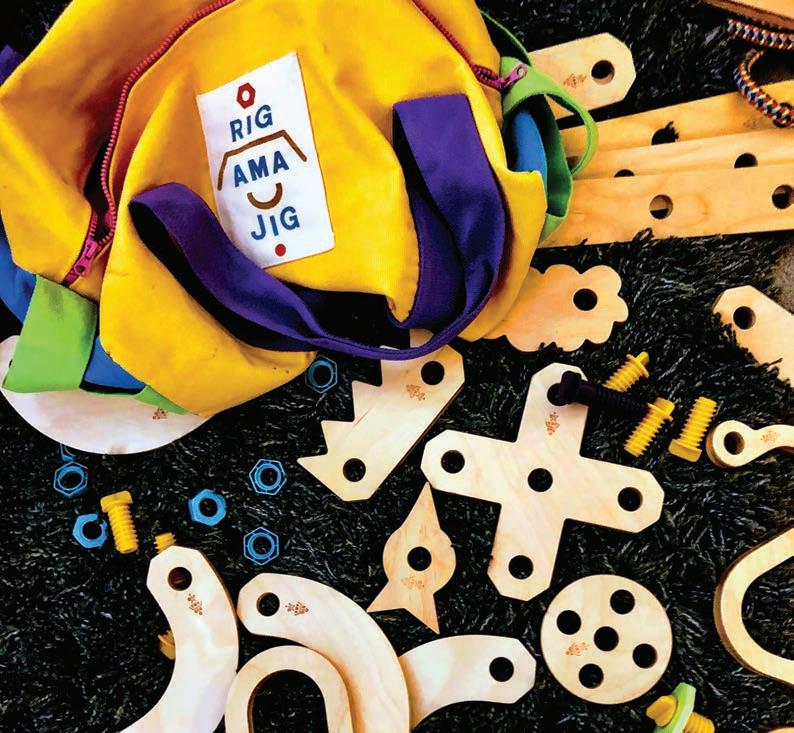
Rigamajig is a series of largescale wooden building kits.
Buyer’s Guide
Mud Kitchen Ph: 1300 79 60 62 Email: liz@mudkitchen.com.au Web: www.mudkitchen.com.au










